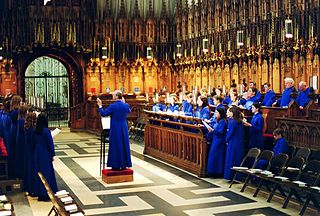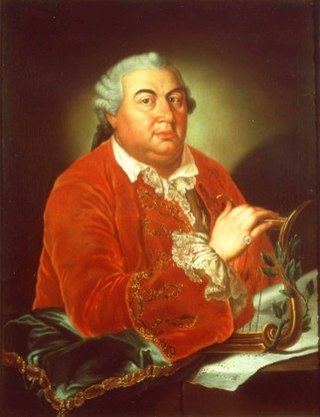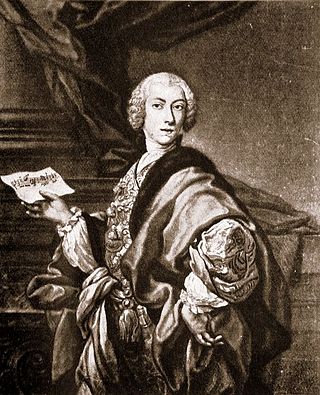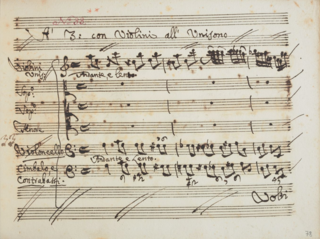Related Research Articles

A choir is a musical ensemble of singers. Choral music, in turn, is the music written specifically for such an ensemble to perform. Choirs may perform music from the classical music repertoire, which spans from the medieval era to the present, or popular music repertoire. Most choirs are led by a conductor, who leads the performances with arm, hand, and facial gestures.

Niccolò Jommelli was an Italian composer of the Neapolitan School. Along with other composers mainly in the Holy Roman Empire and France, he was responsible for certain operatic reforms including reducing ornateness of style and the primacy of star singers somewhat.

Giacomo Antonio Perti was an Italian composer of the Baroque era. He was mainly active at Bologna, where he was Maestro di Cappella for sixty years. He was the teacher of Giuseppe Torelli and Giovanni Battista Martini.

Antonio Alessandro Boncompagno Stradella was an Italian composer of the middle Baroque period. He enjoyed a dazzling career as a freelance composer, writing on commission, and collaborating with distinguished poets, producing over three hundred works in a variety of genres.

Dame Carolyn Emma Kirkby, is an English soprano and early music specialist. She has sung on over 100 recordings.

L'Olimpiade is an opera libretto in three acts by Metastasio originally written for an operatic setting by Antonio Caldara of 1733. Metastasio’s plot vaguely draws upon the narrative of "The Trial of the Suitors" provided from Book 6 of The Histories of Herodotus, which had previously been the base for Apostolo Zeno's libretto Gli inganni felici (1695). The story, set in Ancient Greece at the time of the Olympic Games, is about amorous rivalry and characters' taking places to gain the loved one. The story ends with the announcement of two marriages.

Membra Jesu nostri, BuxWV 75, is a cycle of seven cantatas composed in 1680 by Dieterich Buxtehude and dedicated to Gustaf Düben. More specifically and fully it is, in Buxtehude’s phrase, a “devotione decantata,” or “sung devotion,” titled Membra Jesu nostri patientis sanctissima, which translates from the Latin as Limbs Most Holy of Our Suffering Jesus. Regarding genre, the cycle consists in seven concerto-aria cantatas, a form that had emerged in Germany in the 1660s. The stanzas of its main text are drawn from the medieval hymn Salve mundi salutare, also known as the Rhythmica oratio, formerly ascribed to Bernard of Clairvaux but now thought to be by Arnulf of Leuven. Each cantata addresses a part of Jesus’ crucified body: feet, knees, hands, side, breast, heart and face; in each, Biblical words referring to the limb frame verses of the hymn’s text.
Peter Philips was an eminent English composer, organist, and Catholic priest exiled to Flanders. He was one of the greatest keyboard virtuosos of his time, and transcribed or arranged several Italian motets and madrigals by such composers as Lassus, Palestrina, and Giulio Caccini for his instruments. Some of his keyboard works are found in the Fitzwilliam Virginal Book. Philips also wrote many sacred choral works.
Daniel John Taylor, is a Canadian countertenor and early music specialist. Taylor runs the Theatre of Early Music and teaches at the University of Toronto.
Benjamin Bayl is a Dutch and Australian conductor who works with symphony and chamber orchestras, opera houses and period instrument orchestras in Europe, Asia and Australia.

Roberta Invernizzi is an Italian soprano. She originally studied piano and double bass before turning to singing. She specialises in early music from the baroque and classical period of music.
The King's Consort is a British period music orchestra founded in 1980 by the English conductor and harpsichordist Robert King. The ensemble has an associated choral group, Choir of The King's Consort. Together, they have made over 90 recordings, largely on the Hyperion label, and sold over 1,000,000 discs. The orchestra performs concert seasons in the UK and tours internationally.
Marco Lazzara is an Italian countertenor who sings a wide-ranging repertoire from baroque composers to those of the 20th century and has performed in a number of notable premieres and revivals of rarely performed operas. He has recorded widely on the Bongiovanni, Ricordi, Nuova Era, Forlane, Opera Rara and Dynamic labels.
The Ghislieri, or less commonly Ghisleri, were an ancient Bolognese aristocratic family :
Romina Basso is an Italian mezzo-soprano with an extensive discography of baroque opera recordings. She is particularly noted for her performances of Vivaldi.
Gloria Banditelli is an Italian mezzo-soprano. She debuted in La Cenerentola in Spoleto in 1979. She is well known both for late-classical early-bel canto era roles of Rossini, Cimarosa and Paisiello, and also baroque opera, such as Monteverdi and Cavalli.

J. S. Bach - Das Kantatenwerk is a classical music recording project initiated by the record label of Telefunken in 1971 to record all 193 sacred Bach cantatas. The project was entrusted to Nikolaus Harnoncourt and Gustav Leonhardt. Each conductor had his own instrumental ensemble, based in Austria and the Netherlands respectively.

For Giovanni Battista Pergolesi's L'Olimpiade, see L'Olimpiade (Pergolesi)

Carlo re d'Allemagna is a three-act dramma per musica by Italian composer Alessandro Scarlatti to a libretto by Giuseppe Papis, after Francesco Silvani, premiered at the Teatro San Bartolomeo of Naples on 26 or 30 January 1716. This is the composer's 79th opera out of 114 composed.

Ottaviano Tenerani is an Italian keyboard player, conductor, musicologist. He is the leader of Il Rossignolo, an ensemble on period instruments that he founded in 1998 together with the flautist Marica Testi and the recorder and oboe player Martino Noferi.